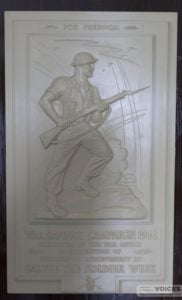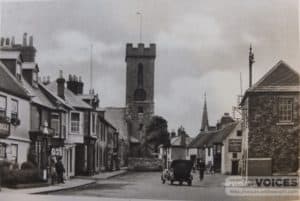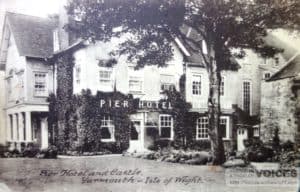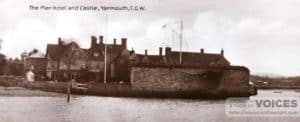I remember the Navy used to take their boats to Yarmouth on a courtesy call. It was good. You could go out and visit the ships, – there was one called ‘Yarmouth’. During the war if you paid to go the ship, you were paid back in savings stamps. All sorts of things you could go on, but you were paid back in savings stamps. Pauline Harwood nee Hatch b 1930
Category Archives: Uncategorized
Mary Lord: WWII, school, rations 1940s
My best friends at that time were evacuees, but we weren’t especially aware of the war, even though my dad was working in a shipyard in Cowes.
We were always hungry, we used to eat the acorns from the trees in the playground. We didn’t eat very many because they took so long to peel. We were sent out to pick blackberries, and rosehips for vitamin c to supplement the food. It must have been along the railway line, and there were still trains, but I don’t remember any warnings or worries. The boys didn’t do much picking, just opened up the rosehips and put the seeds down people’s necks as itching powder.
I remember getting occasional packets of chocolate powder which was supposed to be for making hot chocolate, but my mother used to let me sit on the doorstep and dip my finger in the powder, the nearest we got to sweets, although later we did have a 2oz ration from Mr. Burt’s shop. Mr Burt’s shop
Mary Lord b 1936
Nick Chandler : WWII boys
Although there was a war on, we used to get about all over the place. Out Bouldnor, there were troops out there. We used to go over Thorley Copse a lot, play down the marsh and up the Rec, on the beaches, anywhere; it was amazing really.
I remember towards the end of the war we went over Sandhard and found an airman’s glove on the beach. We picked it up and 2 fingers fell out of it. I remember that ever so well.
One day 2 or 3 of us older boys went up Red Lake where the old sewer pipe was and were walking along it. We got machine gunned by a Messerschmidt and we all leapt off it. We reckoned at the time they thought it was part of Pluto. Nick Chandler b 1937
Blanche Kennard : WWII WRNS drill 1940s
We used to have Squad Drill in the Square, although there weren’t many of us. Sergeant Harris – a marine, used to keep us drilling on a Saturday when we had the afternoon off, and the bus went at 10 to 1. Lots of people wanted to go to the Pictures, I wanted to go to visit my parents.
He used to say, ‘Dism……..’ and someone would move a foot, and he’d say, ’Attention!’ And keep us there till 5 minutes before the bus went from outside the Town Hall.
b 1922
Pier Hotel: WWII, WRNS 1940s
During WWII, The Pier Hotel, now The George, was central office for ‘XDO West’ signals.
Signatures of WRNS, Marines and others stationed at Pier Hotel 1940s
Blanche Kennard: WWII, WRNS billets 1940s
My first billet was Gordon House in the High Street, (where Glasspool’s Chemist was, now Black rock Insurance). Years later I’d walk past and look at a window and think, that was my room. There was a sort of dormitory for seven WRNS on the top floor in the Pier Hotel (The George) and lots more at HMS Manatee ( Norton Holiday camp). I had my 21st birthday when I was stationed at The Pier Hotel.
The central office was in the Pier Hotel, dealing with signals although we never knew much. It was ‘XDO West’ and the WRNS Officer in charge was named Greenshields. Blanche Kennard nee Dore b 1922
Blanche Kennard : WWII WRNS 1940s
My father worked on a farm near Ryde, which was where I grew up. I had a friend Peggy and we went everywhere together, so we both applied to join the WRNS. I thought I’d join the WRNS and see the world. Peggy passed and went to Eastbourne but I didn’t – I had a couple of teeth which needed fixing and they wouldn’t have me till they were done.
After my 2 weeks training they sent me to Yarmouth. I didn’t like it at first, I wanted to be with my friend, but after a fortnight I loved being in Yarmouth. I was a caterer, the Petty Officers’ Steward for the officers stationed in the Pier Hotel (now The George). My job was to serve them their food in The Kings Head, and help in the kitchen and do the shopping. I used to go up to Ablitts to buy their meat. Blanche Kennard nee Dore b 1922
Betty Coates-Evans: WWII Evacuees 1940s
We had a Morrison shelter in the living room. I liked it, it was good fun to make a den and play in.
My mother was in the WRVS and we had a spare room so we took in evacuees – a mother and daughter about my age, from Plymouth. The father was in the Navy, on convoys, and used to call in when his ship docked in Portsmouth. Sadly, he didn’t return from the final convoy. When the mother and daughter went back to Plymouth, blankets and my mother’s prized cottage china tea set disappeared with them. Betty Coates Evans nee Lock b 1938
Pauline Harwood : WWII evacuees 1940s
When the evacuees came, I remember they swarmed into school. My mother had to take 2 or 3 in overnight – head to tail in the bed. One boy called Bernard White, stayed. We didn’t like him, but mother did – he had ginger hair, same as Jack used to. They came from Milton Road, Portsmouth. He was a big daredevil boy who used to go beachcombing, I mean beachcombing in the war time! He used to bring home all sorts of things. Eventually he went back and when we heard from him last he was quite high up in the Navy. He had done well for himself, but we didn’t like him. Pauline Harwood nee Hatch b 1928
Pat Burt, Annette Haynes: WWII air raid sirens
I remember hearing war had broken out on the radio. We lived in the stone cottage ‘Kevack’ in the High Street. During the early part of the war when the air raid sirens went, we used to rush over and down into the cellars of North House, but that was only for a short while until we had the Morrison table shelter delivered – I think we had that by 1942. Pat Burt
I was away in Castle Bromwich, near Birmingham, when war broke out. I was staying with a friend of my mother’s, I called her my aunt – she wanted to adopt me. I was so worried because my mother couldn’t get me a gas mask because I wasn’t at home, and my ‘aunt’ couldn’t get a gas mask for me. I had to come back home of course.
We had an Anderson shelter in the garden. I remember my brother saying, ‘If I’m going to be killed, I’ll be killed in my bed. I’m not going down to the shelter.’
Annette Haynes










